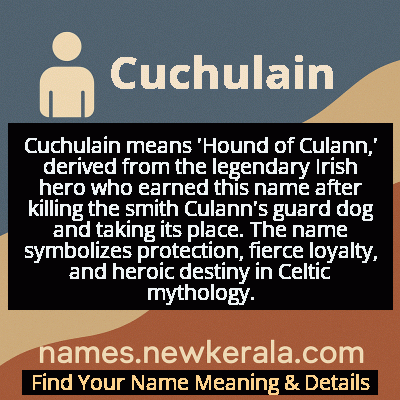Cuchulain Name Meaning & Details
Origin, Popularity, Numerology Analysis & Name Meaning of Cuchulain
Discover the origin, meaning, and cultural significance of the name CUCHULAIN. Delve into its historical roots and explore the lasting impact it has had on communities and traditions.
Name
Cuchulain
Gender
Male
Origin
Celtic
Lucky Number
2
Meaning of the Name - Cuchulain
Cuchulain means 'Hound of Culann,' derived from the legendary Irish hero who earned this name after killing the smith Culann's guard dog and taking its place. The name symbolizes protection, fierce loyalty, and heroic destiny in Celtic mythology.
Cuchulain - Complete Numerology Analysis
Your Numerology Number
Based on Pythagorean Numerology System
Ruling Planet
Moon
Positive Nature
Diplomatic, friendly, artistic, empathetic.
Negative Traits
Over-sensitive, moody, indecisive, prone to self-pity.
Lucky Colours
Green, cream, white.
Lucky Days
Monday.
Lucky Stones
Pearl, moonstone.
Harmony Numbers
1, 3, 4.
Best Suited Professions
Diplomats, mediators, caregivers, artists.
What People Like About You
Cooperative spirit, friendliness, artistic talent.
Famous People Named Cuchulain
Cú Chulainn
Mythological Hero
Defended Ulster single-handedly against Queen Medb's army in the Cattle Raid of Cooley
Cuchulain (literary)
Cultural Symbol
Became central figure in Irish Literary Revival through works of Yeats and Lady Gregory
Cuchulain (art)
National Symbol
Immortalized in bronze as symbol of Irish rebellion and sacrifice in 1916 Rising
Name Variations & International Equivalents
Click on blue names to explore their detailed meanings. Gray names with will be available soon.
Cultural & Historical Significance
Extended Personality Analysis
The name Cuchulain evokes a personality marked by intense passion, unwavering loyalty, and heroic determination. Individuals associated with this name are often perceived as natural protectors with a strong moral compass and fierce dedication to their principles. They tend to be charismatic leaders who inspire others through their courage and commitment, yet may struggle with controlling their powerful emotions when faced with injustice or threat to their loved ones. This personality archetype combines the warrior's strength with the poet's sensitivity - capable of great ferocity in defense of others while maintaining deep emotional connections and artistic appreciation. The tragic elements of the mythological Cuchulain suggest a tendency toward self-sacrifice and an almost obsessive adherence to personal codes of honor. Such individuals often bear the weight of great responsibility willingly, seeing themselves as guardians of their community or cause. Their complexity lies in balancing their immense capabilities with human vulnerabilities, making them both inspiring and relatable figures who embody the Celtic ideal of complete commitment to one's destiny and duties.
Modern Usage & Popularity
In contemporary naming practices, Cuchulain remains a rare and highly specialized choice, primarily used within deeply Irish-cultural contexts or by parents seeking to make a strong mythological statement. The name's usage is almost exclusively limited to Ireland and Irish diaspora communities, with the Gaelic spelling 'Cú Chulainn' being preferred in Ireland itself. It appears more frequently in artistic and literary contexts than in birth registries, often chosen by writers, artists, or cultural enthusiasts rather than mainstream parents. The name's complexity, strong mythological associations, and challenging pronunciation have prevented it from achieving widespread popularity. However, it enjoys a steady niche presence among those valuing Irish heritage, with occasional appearances in fantasy literature, video games, and Celtic revival movements keeping the name culturally relevant if not commonly used.
Symbolic & Spiritual Meanings
Symbolically, Cuchulain represents the ultimate embodiment of the heroic ideal in Celtic culture - a figure who transcends mere mortal capability while remaining bound by human emotions and fate. The name symbolizes the guardian protector (as the 'hound' suggests), the tragic hero destined for greatness and sacrifice, and the bridge between human and divine realms. It carries deep metaphorical meaning about the nature of heroism itself - that true greatness often comes with profound personal cost and that protection and destruction can emerge from the same source. The transformation from Setanta to Cuchulain symbolizes the journey from potential to actualized destiny, while his geasa (taboos) represent the complex interplay between personal power and societal rules. In broader cultural terms, Cuchulain has become a metaphor for Irish resilience, cultural preservation, and the eternal struggle between individual will and collective destiny.

